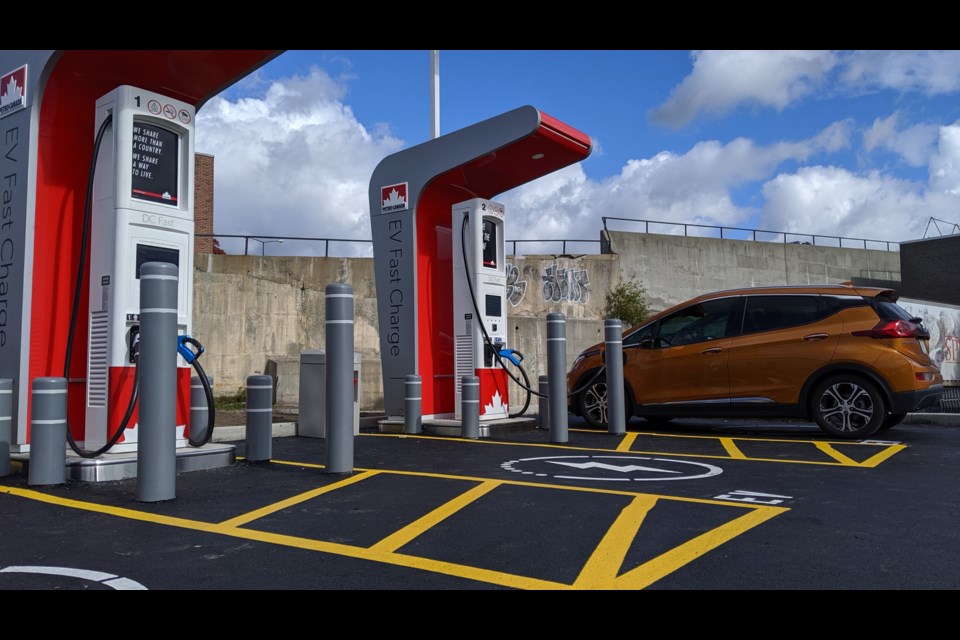What is Greater Sudbury’s biggest source of greenhouse gas emissions? Transportation tops the list at 43 per cent. Most of that is from gassing up our private vehicles: our SUVs, vans and pick-ups account for 52 per cent of vehicle emissions, our cars 40 per cent. That means the choices we make in how we get around make a big difference.
What can you do? Start with trip planning. Where do you need to get to on a regular basis? Can you get there walking, rolling, biking, or on transit? Can you carpool? What errands can you combine to do fewer trips? Most people are surprised to learn how often they can leave their car at home, and how many Greater Sudbury residents live without a car at all.
Many Greater Sudbury residents do require a private vehicle to meet their needs. That is why transitioning to electric vehicles is one of the top actions needed to achieve net zero greenhouse gas emissions in Greater Sudbury’s Community Energy and Emissions Plan. To meet this target, 100 per cent of new vehicle sales will be electric by 2030, and 100 per cent of the transit and city fleet will be electric by 2035.
Electric vehicles are expected to match the price of conventional vehicles by the mid-2020s. Lifetime costs are already lower for electric vehicles, with no fuel expenses, and little maintenance needed.
However, Greater Sudbury’s Electric Vehicle Study notes that subsidies and incentives, expanded charging infrastructure, supportive policy, greater awareness, and leadership will all be needed to assist a rapid transition to electric vehicles. Networks of electric vehicle chargers are progressing in Ontario and Canada. Charging infrastructure in Greater Sudbury and Northern Ontario is already improving, and Greater Sudbury has plans for dedicated EV charging and parking spots.
Sudbury artist and teacher Jennifer Holub bought a used plug-in hybrid electric vehicle primarily to reduce her fossil fuel consumption.
“The other bonus is that I have saved thousands of dollars in gas and it is a very silent ride,” Holub said.
A pre-owned vehicle was in her price range, and she was also able to receive a $1,000 Used EV Incentive through the EV Discovery Centre.
“If you are charging at off-peak hours it is not very expensive to charge. We have not noticed a significant raise in our electricity bill. We estimate that if I needed to charge it in full every day (which I don’t because I only use about 30-40 per cent of my range each day) it would cost $1 per day or $30 per month in electricity.”
Charging at home means you can always leave with a “full tank.” The 87-km range more than covers her needs for work and errands in all seasons. Holub advises doing due diligence and investigating the model, maintenance history, and available incentives. Many new electric vehicles models have 400+ km ranges.
When paired with low carbon renewable electricity, transitioning to electric vehicles provides an opportunity to cut emissions, while also reducing air pollutants and noise. There are health and economic co-benefits, too. Combined with car-shares, convenient public transportation, great sustainable transportation infrastructure, and walkable communities, electric vehicles are part of low carbon transportation in a greener community.
Devin Arthur is on the management team of the Electric Vehicle Society, a Canada-wide owners advocacy group. For more information about electric vehicles in Greater Sudbury, the local chapter of EV Society is available to answer any questions you may have. You can find them on social media or by e-mail at [email protected].
Naomi Grant co-chairs Coalition for a Liveable Sudbury, a grassroots group of citizens and community groups who share a vision of Sudbury as a green, healthy and engaged community. For more local stories and additional information on a net zero future for Greater Sudbury, see liveablesudbury.org/net_zero_sudbury.
